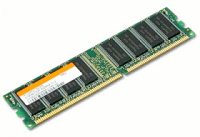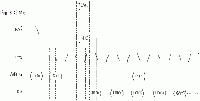Difference between revisions of "BEDO RAM"
RacoonRider (talk | contribs) |
RacoonRider (talk | contribs) |
||
| Line 2: | Line 2: | ||
[[File:Bedo.gif|200px|thumb|BEDO RAM Diagram]] | [[File:Bedo.gif|200px|thumb|BEDO RAM Diagram]] | ||
BEDO RAM means Burst Enhanced Data Out RAM. Burst EDO was a faster type of EDO that gained speed by using an address counter for next addresses and a pipeline stage that overlapped operations. EDO memory was superseded by SDRAM. | BEDO RAM means Burst Enhanced Data Out RAM. Burst EDO was a faster type of EDO that gained speed by using an address counter for next addresses and a pipeline stage that overlapped operations. EDO memory was superseded by SDRAM. | ||
| + | |||
| + | BEDO RAM was supported by the following chipsets: | ||
| + | *VIA Apollo VP | ||
| + | *OPTi ViperMax | ||
| + | *PCChips VXPro | ||
| + | *PCChips VXPro+ | ||
| + | |||
| + | ''Note that wikipedia states that all VIA chipsets up to Apollo Pro (Slot 1) support BEDO. This fact is not confirmed in any of the linked sources and is accepted "as is" for some mysterious reason.'' | ||
Burst EDO, while a good idea, was dead before it ever was born. The addition of a burst mode, along with a dual bank architecture would have provided the 4-1-1-1 access times at 66 MHz that many expected with SDRAM. Burst mode is an advancement over page mode, in that after the first address input, the next 3 addresses are generated internally, thereby eliminating the time necessary to input a new column address. Unfortunately, Intel decided that EDO was no longer viable, and SDRAM was their preferred memory architecture so they did not implement support of BEDO into their chipsets. In fact, several large memory manufacturers had put considerable time and money into the development of SDRAM over the past decade, and were not very happy with the BEDO design. | Burst EDO, while a good idea, was dead before it ever was born. The addition of a burst mode, along with a dual bank architecture would have provided the 4-1-1-1 access times at 66 MHz that many expected with SDRAM. Burst mode is an advancement over page mode, in that after the first address input, the next 3 addresses are generated internally, thereby eliminating the time necessary to input a new column address. Unfortunately, Intel decided that EDO was no longer viable, and SDRAM was their preferred memory architecture so they did not implement support of BEDO into their chipsets. In fact, several large memory manufacturers had put considerable time and money into the development of SDRAM over the past decade, and were not very happy with the BEDO design. | ||
| Line 9: | Line 17: | ||
=Sources= | =Sources= | ||
1: [http://www.tomshardware.com/reviews/ram-guide,89-7.html Tom's Hardware Guide] | 1: [http://www.tomshardware.com/reviews/ram-guide,89-7.html Tom's Hardware Guide] | ||
| + | 2: [http://www.motherboards.org/mobot/chipsets/ Motherboards.org chipset database] | ||
Revision as of 03:39, 7 April 2013
BEDO RAM means Burst Enhanced Data Out RAM. Burst EDO was a faster type of EDO that gained speed by using an address counter for next addresses and a pipeline stage that overlapped operations. EDO memory was superseded by SDRAM.
BEDO RAM was supported by the following chipsets:
- VIA Apollo VP
- OPTi ViperMax
- PCChips VXPro
- PCChips VXPro+
Note that wikipedia states that all VIA chipsets up to Apollo Pro (Slot 1) support BEDO. This fact is not confirmed in any of the linked sources and is accepted "as is" for some mysterious reason.
Burst EDO, while a good idea, was dead before it ever was born. The addition of a burst mode, along with a dual bank architecture would have provided the 4-1-1-1 access times at 66 MHz that many expected with SDRAM. Burst mode is an advancement over page mode, in that after the first address input, the next 3 addresses are generated internally, thereby eliminating the time necessary to input a new column address. Unfortunately, Intel decided that EDO was no longer viable, and SDRAM was their preferred memory architecture so they did not implement support of BEDO into their chipsets. In fact, several large memory manufacturers had put considerable time and money into the development of SDRAM over the past decade, and were not very happy with the BEDO design.
Except for support of bus speeds of 100 MHz and faster, BEDO would probably have been a much faster and more stable memory than SDRAM. Essentially, BEDO lost support as much for political and economic reasons as for technical ones, it seems.
Sources
1: Tom's Hardware Guide 2: Motherboards.org chipset database

